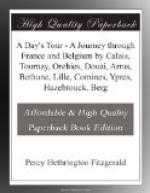On this ‘grand’ place I noticed an old house bearing date ‘1625,’ and some wonderful feats in the way of red-tiled roofing, of which there were enormous stretches, all narrow, sinuous, and suggesting Nuremberg. I confess to having spent a rather weary hour here, and sped away by the next train.
VIII.
LILLE.
Two o’clock. We are on the road again; the sun is shining, and we are speeding on rapidly—changing from Flanders to France—which is but an hour or so away. Here the bright day is well forward. Now the welcome fat Flemish country takes military shape, for here comes the scarp, the angled ditch, the endless brick walling and embankment—a genuine fortified town of the first class—LILLE. Here, too, many travellers give but a glance from the window and hurry on. Yet an interesting place in its way. Its bright main streets seem as gay and glittering as those of Paris, with the additional air of snug provincial comfort. To one accustomed for months to the solemn sobriety of our English capital, with its work-a-day, not to say dingy look, nothing is more exhilarating or gay than one of these first-class French provincial towns, such as Marseilles, Bordeaux, or this Lille. There is a glittering air of substantial opulence, with an attempt—and a successful one—at fine boulevards and fine trees.
The approach to Lille recalled the protracted approach to some great English manufacturing town, the tall chimneys flying by the carriage-windows a good quarter of an hour before the town was reached. A handsome, rich, and imposing city, though content to accept a cast-off station from Paris, as a poor relative would accept a cast-off suit of clothes. The fine facade was actually transported here stone by stone, and a much more imposing one erected in its place.
The prevailing one-horse tram-cars seem to suit the Flemish associations. The Belgians have taken kindly and universally to them, and find them to be ‘exactly in their way.’ The fat Flemish horse ambles along lazily, his bells jingling. No matter how narrow or winding the street, the car threads its way. The old burgher of the Middle Ages might have relished it. The old disused town-hall is quaint enough with its elaborately-carved facade, with a high double roof and dormers, and a lantern surmounting all. A bit of true ‘Low-Countries’ work; but one often forgets that we are in French Flanders. Entertaining hours could be spent here with profit, simply in wandering from spot to spot, eschewing the ‘town valet’ and professional picture guide. It is an extraordinary craze, by the way, that our countrymen will want always ‘to see the pictures,’ as though that were the object of travelling.
[Illustration: BOURSE. LILLE.]




